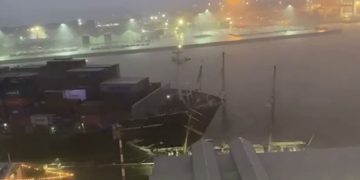As part of their Good Catch series, American P&I has published a safety animation to inform interested parties about the proper application of hot work permit procedures.
According to American Club, a general cargo vessel is transit to the next port after having discharged its previous cargo, which included deck cargo, stowed and secured on the hatch covers with securing brackets and stops.
Removal of the securing brackets and stops is required before arrival at the load port. This will involve carrying out hot work using an oxyacetylene torch to cut off the securing brackets and stops. The work will be done by the crew. It is routine work, and will be done during daylight hours, working on top of a cargo hatch cover.
As explained, the weather is good, but a little windy. The risk is that the wind may carry some sparks, or even molten slag, away from the area and drop them onto combustible material nearby or in the cargo hold below.
In preparation for the work, the Bosun and an AB are pushing an oxyacetylene trolley along the deck. Stopping at the work site, the Bosun looks at the AB and says:
Before you start, we will need a hot work permit?
The AB said that they don’t need a hot work permit. “We do this work all the time”.
Then the Bosun said that is is required by the company and their SMS.
According to the video, a hot work permit was issued for a shore contractor to cut off a series of brackets and cargo stops.































































